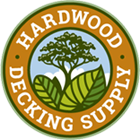Why Batu Is Better Than Mahogany

Many homeowners covet the beautiful, high-end look of mahogany. It’s only natural that mahogany is often a material that homeowners consider when installing a new deck or fence. However, mahogany, which can be problematic, is far from the best option. Learn more about mahogany and the superior option, Batu!
Don’t pay a premium for inferior mahogany
Mahogany is known to be not only beautiful but resistant to pests and rot as well. However, mahogany poses a very real issue: you don’t always know what you’re getting. Due to mahogany’s popularity, the name gets used a lot and in ways that are confusing. Even within the Swietenia genus, which is known as “genuine mahogany,” there is one species (Mexican Mahogany) that provides lumber of poor quality. Additionally, there is old-growth genuine mahogany and plantation-grown genuine mahogany.
- Old-growth mahogany is difficult to source and extremely expensive.
- Plantation mahogany has similar coloring as old growth, but it significantly lacks in strength and durability so it’s unsuitable in certain cases, especially exterior projects.
Keep in mind … many companies don’t differentiate between old-growth mahogany and plantation mahogany, meaning you might end up paying a premium price for an inferior product.
Outside of Swietenia, there’s also African Mahogany from the Khaya genus. This wood has some similarities to genuine mahogany as the two are somewhat related, but purists know there are real differences. There are also many species in the Meliaceae family that are technically related to mahogany but have different characteristics. Lastly, there are species that aren’t even remotely related to true mahogany that uses the name, such as Sipo Mahogany and Philippine Mahogany. These woods have their own positive attributes but they’re often passed off to consumers as genuine mahogany to justify a higher price tag. Why spend a lot of money on a type of wood when you can’t even be sure what you’re really getting?
Batu is an exceptional alternative to mahogany
Batu, often called red balau, is from Indonesia. It has a gorgeous reddish-brown color that is similar to genuine mahogany. Its color is consistent throughout the lumber and the texture is even. As with all our tropical hardwoods, Batu is strong and durable, with a Janka Hardness Rating of 2,100 pounds. It resists rot and decay, as well as termites and fungus, so it’s easy to see why Batu has a lifespan of over 30 years. Batu will give your fence or deck the look of genuine mahogany but with superior performance and a lower price tag.
People often ask us to compare Batu to Ipe, our most popular tropical hardwood. While both have a high density and impressive hardness, Batu is easier to work with than Ipe since it’s lighter-weight. Plus, Batu is significantly more affordable than Ipe. If your outdoor project doesn’t require the extreme hardness of Ipe, then Batu is an excellent alternative.
Consider Batu a straight-forward option
Topical hardwoods have no comparison. Species like Batu are popular for exterior uses. Besides being attractive, they’re durable and strong. Many can be purchased with sustainability certification, too. Their lumber is usually free of blemishes and produced in long lengths. Hardwoods a great choice for outdoor living areas because of their strength and ability to endure a variety of inclement weather.
If you’re interested in Batu for your fence or deck, contact Hardwood Decking Supply! Our experienced hardwood decking specialists will work with you to ensure your Batu project is a success. We have Batu available in 1×4, 1×6, 5/4×4, 5/4×6, 2×2, 2×4, 2×6, and 4×4.
The best part? You won’t have to worry and wonder about what you’re getting when you purchase from Hardwood Decking Supply. For decades, we’ve been conducting business with honesty and integrity. Contact us today or call 866-452-2573.
